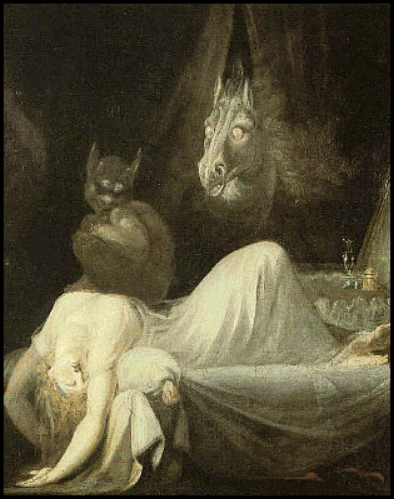Poems
Anna Journey
(Louisiana State University)

- buttered cigarettes
in a Chinese noodle bowl. A frieze
of blue mountains along its lip. Sleep's
porcelain borders. Next a salt sandwich,
a slice of raw bacon.
Like many of the other poems in this collection of thirty-five, there is a taint of mystery, an otherworldliness, a "central black pond" with
- a circle
of faces from which whispers rise like
scavenger birds.
In addition, there is a bit of folklore which might possibly give a sleepless night or two to those in the medical profession who willy-nilly hand out 3,554,659 or so prescriptions for zolpidem tartrate every year to sleepless Americans:
- After the car wreck, the cops find her
in the middle of the intersection pissing
the shape of the Land of Insomnia,
which steams as it spreads, which freezes, fixed
to the crosswalk's bars.
"The Land of Insomnia" could well have been the subtitle for Vulgar Remedies, but, along with sleeplessness, the dreams and folklore are recurrent, strong. What to do with a tooth after extraction? Smother in salt and burn it, because if a fox finds and gnaws it, you'll grow "a gray fang" in later life. If chewed by a bear you'll develop a "yellow snaggletooth." And, if, during your childhood, you hold a dying creature, "you'll have shaky hands all your life." (Ms. Journey thought it was caffeine; no, it was a cardinal she rescued when she was seven.)
So there's a fair mix of mystery and nature and mid-American angst throughout, along with a now-dead toothless old uncle who swam with her in the warm gulf and asked her "where'd you get / those boobs." However, he returns from the dead, "sheepish," such that he glows
- like a grilled sweet onion with one side
charred from a fire. He asks me to retrieve
his coffee can stuffed with an ounce of Mexican weed
from the garage before my aunt finds it.
Ms. Journey is snippy, funny, waspish, mostly lively, although some of her poems do trail off into sartorial mysteries, such as bedcovers with
- faceless Dutch girls
in patterns on the quilt, swallowed in bonnets, each one distant
from the others, as if lost ...
But her ability to capture memory snippets of childhood is original, singular, funny, strange, lively, often lovely: "the boy from down the street who often begged / to suck my eyeball.
- My pupil
rolled under his tongue, the one
whose scent was clove smoke and a soft brie
winging after a blinding light,
I must've singed the buds
in his tongue to desert thistles ---
left a taste like a saint's
charred footprint.
Her shaping of family memories is touched with a gentleness that can be as beguiling as otherworldly. An aunt who works as a prison nurse, who
- might wake
one man with the kiss
of a needle and another with the firm
boa-squeeze of the blood pressure meter. She might
hold them each
a little longer, before she lets
go, before the rest of the men know
her neck's
slow tobacco scent, the way she gazes out
the picture window while unstrapping
the machinery
until the blood
comes rushing back.